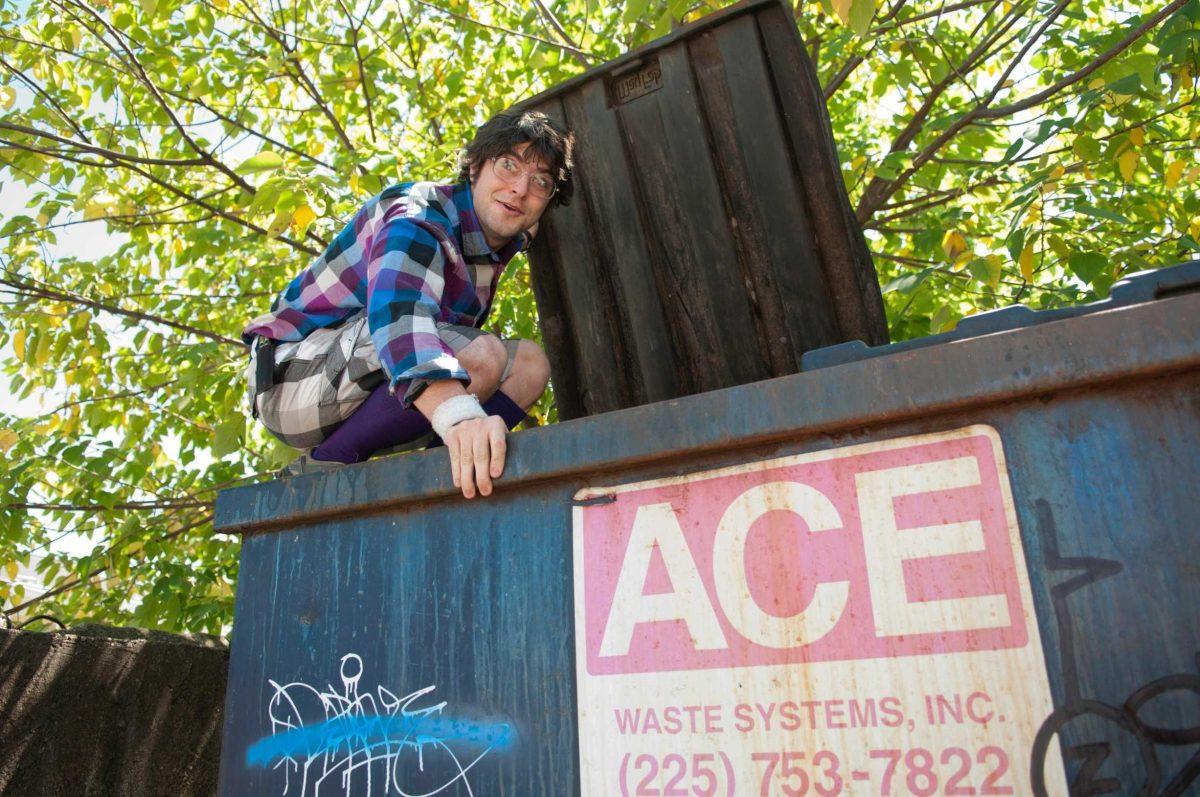Anthropology senior Mike Skaggs’ house is fully furnished. And he didn’t spend a penny on it.
For Skaggs, an avid dumpster diver, one man’s trash is his treasure.
Skaggs’ definition of dumpster diving ranges from climbing into a dumpster and rummaging through garbage to picking up abandoned pieces of furniture off the side of the road.
He said he has no problem jumping into a dumpster and digging around for something he finds intriguing or useful.
He’s picked up desks, couches, chairs, recliners, tables, stools, hutches, bed frames and bicycle parts from the trash. Skaggs said he has five televisions in his house, and he only paid for one.
“I usually go [dumpster diving] because I see something tantalizing sticking out,” he said.
Skaggs has also gone dumpster diving for food. He said some of the local homeless taught him that the best time to go searching is immediately after restaurants’ closing time.
Skaggs said he also learned that move-in and move-out days are jackpots for dumpster divers, especially near campus dorms.
Other students like Anneke Miller, elementary education senior, don’t practice “dumpster diving” quite so literally.
Miller used to work as a resident assistant in Miller Hall and said she’s found dozens of salvageable items residents tossed in the trash, including brand-name products like Vera Wang perfume, a North Face jacket and a Prada bag.
Miller said she never took anything from inside the dumpsters but had no problem with reclaiming items laid next to them.
“I never thought of it as weird or even as an activity,” Miller said.
She said she thinks dumpster diving is “awesome and free,” and the “free” section of Craigslist is also a good place for bargain finds.
But diving on campus could have some unexpected consequences.
Jay High, communications manager for Residential Life, said the department does not permit dumpster diving.
“We’re all about sustainability and recycling, but it’s a safety issue,” High said.
If students or campus visitors are caught rummaging through dumpsters, High said ResLife will contact the LSU Police Department.
Skaggs said he’s also concerned about the dangers of dumpster diving.
“I’m really careful,” Skaggs said. “It used to be a thrill to just jump in, but now I take a good look, put a foot in and just see what’s in trash.”
Though Harris dives to ensure garbage and recyclables are properly sorted, he said he’s found some prizes in his excursions.
Harris said the majority of his office’s decor and furniture were salvaged from the trash. He’s found a mini fridge, frames, tables, chairs and computers.
Harris said one of his best finds was a Toshiba laptop with a black leather carrying case and accessories. He said the computer was infected with viruses, but a simple reformatting put it in perfect working condition again.
“People dispose of stuff because of lack of knowledge, but I was able to donate [the computer] to someone who needed it,” Harris said.
But not everyone is interested in going through the garbage.
Amanda Tabor, biology junior, said when she thinks of dumpster diving, one word pops into her head – dirty.
“I wouldn’t [dumpster dive] unless I dropped something important in the trash,” Tabor said.
Harris said the University switched to single-stream recycling in 2006, which means all recyclables – paper, cardboard, plastic, etc. – may be placed into the same bin.
The University recycles approximately 1,500 tons of materials a year, Harris said.
____
Contact Emily Herrington at eherrington@lsureveille.com
Dumpster divers find furniture, brand names in trash
September 13, 2011






